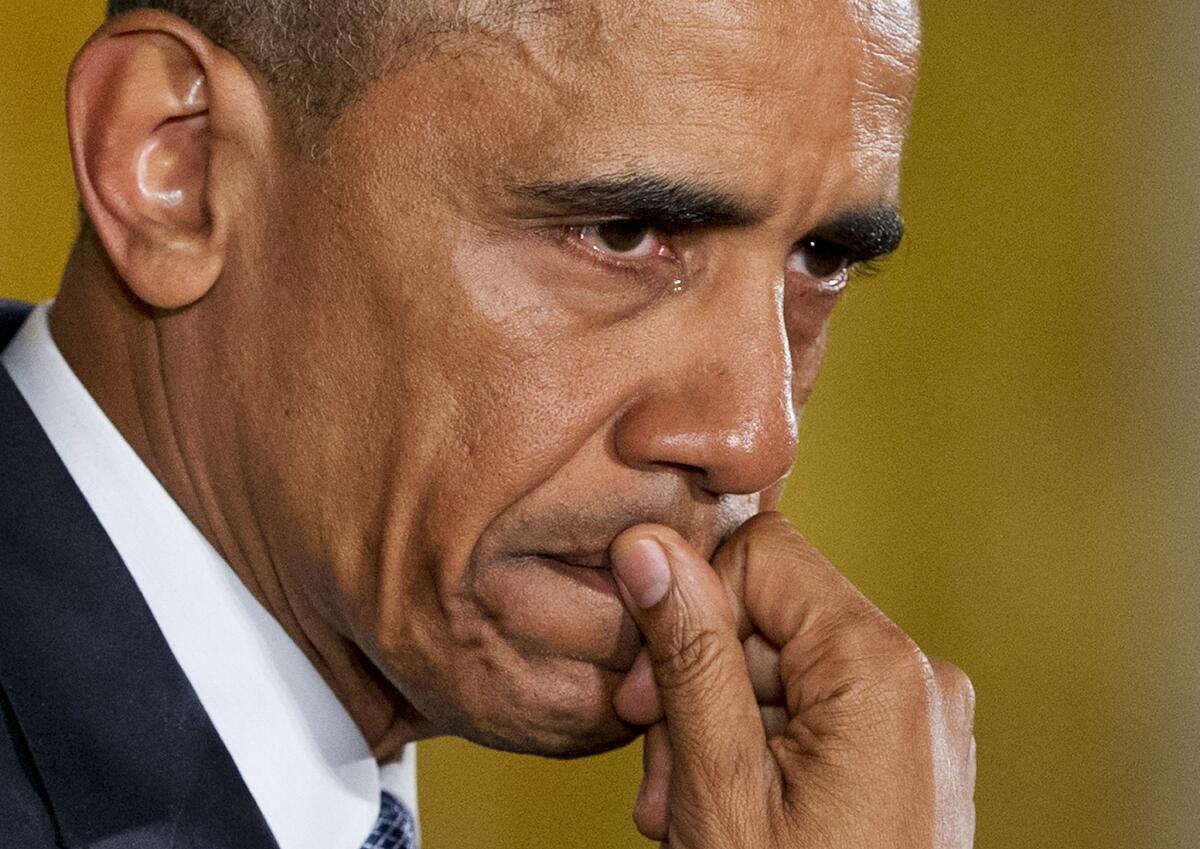Column: Obama’s teary, yet mild, gun reform

President Obama speaks about the youngest victims of the 2012 Sandy Hook Elementary School shootings while discussing his executive actions on gun regulations.
- Share via
The president of the United States wept on Tuesday. He wept when he came to the part of his speech about the first-graders.
“First-graders!” he said. “Every time I think about those kids, it gets me mad.”
Barack Obama, purportedly an emotionless man, has been passionate about gun control ever since the 2012 school massacre in Newtown, Conn., when 20 children and six adults were killed. Aides say his meetings with the Newtown parents included tears, too.
More broadly, Obama seemed to signal that he plans to make the most of his last year in office through unilateral action.
But Obama’s most powerful emotion on this issue isn’t empathy; as he said, it’s anger. He’s angry that Republicans in Congress blocked new gun control laws even after Newtown. He’s frustrated that he hasn’t been able to rally political pressure in favor of new regulations. And he’s disappointed that his legacy may be nothing more than the mild executive actions he unveiled this week.
The measures Obama described on Tuesday are sensible but modest, limited by what his lawyers said he could do without the approval of Congress.
He expanded an existing regulation to ensure that more gun buyers receive background checks, and created a new rule to require that dealers report when guns are lost or stolen.
Most significant, Obama broadened the definition of a gun dealer to make it clear that anyone who sells firearms “as a regular course of trade or business” must conduct background checks on customers. Until now, people who sold guns over the Internet, or informally at gun shows, could claim that they were merely engaging in a hobby — which meant no checks were needed.
The government’s new “clarification” means federal law enforcement can more easily go after anyone who frequently sells guns to strangers for profit. If the sellers fail to conduct background checks, they could be fined as much as $250,000.
Thousands of gray-area gun dealers are “on notice,” Atty. Gen. Loretta Lynch said.
That’s not an infringement of their right to keep and bear arms; there’s no limit on how many guns they can own. Instead, it’s a regulation of their freedom to conduct business — the same regulation that gun stores already endure.
Of course, that didn’t stop the National Rifle Assn. and its allies from claiming that Obama’s action was dangerous. “The proposed executive actions are ripe for abuse,” the NRA warned. House Speaker Paul D. Ryan (R-Wis.) issued a statement charging that Obama was targeting “the most law-abiding of citizens” instead of terrorists.
Despite that heated rhetoric, the real-world impact is likely to be small — mostly because the agency that’s charged with enforcing Obama’s orders doesn’t have the staff to do the job.
The Bureau of Alcohol, Tobacco, Firearms and Explosives is the federal agency that oversees gun dealers, and Congress has deliberately starved its budget for years.
“ATF is massively underfunded and overworked,” said Matt Bennett of Third Way, a centrist group that has worked for gun control legislation. “As it is, they’re able to inspect federally licensed dealers, on average, only once every seven years.”
Obama on Tuesday promised to include funding for 200 more ATF agents in his budget this year — but that merely amounts to a request that Congress is certain to reject.
“The odds that Congress will go along are roughly zero,” Bennett said. “There is, alas, no way around that.”
Still, Obama’s actions did include some useful improvements, he said, including a shift of money within the Federal Bureau of Investigation to strengthen the background check system. And there are two ways Obama’s actions could have broader political effects.
One is that the president has injected gun control directly into the presidential election. If his successor is a Republican, these executive orders will be overturned (on “day one,” some GOP candidates have already promised). If his successor is a Democrat, they will remain in place — even if Congress remains under Republican control, as expected.
More broadly, Obama seemed to signal that he plans to make the most of his last year in office through unilateral action.
Some of the measures the president unveiled this week were proposed by administration officials last fall, but the White House hesitated then — in part because it still needed Congress to pass a spending bill for 2016.
That bill is now in place, and Obama appears to believe he no longer needs to bargain with Republican leaders, who are focused on winning November’s election.
Indeed, White House officials say they are considering more executive actions in areas from climate change (including new emissions standards for heavy trucks) to the U.S. military detention center at Guantanamo Bay, Cuba (which Obama vowed to close in 2009).
This week’s gun control measures were only the first act in a final year that promises even sharper partisan combat than before.
Twitter: @doylemcmanus
Follow the Opinion section on Twitter @latimesopinion and Facebook
More to Read
A cure for the common opinion
Get thought-provoking perspectives with our weekly newsletter.
You may occasionally receive promotional content from the Los Angeles Times.











